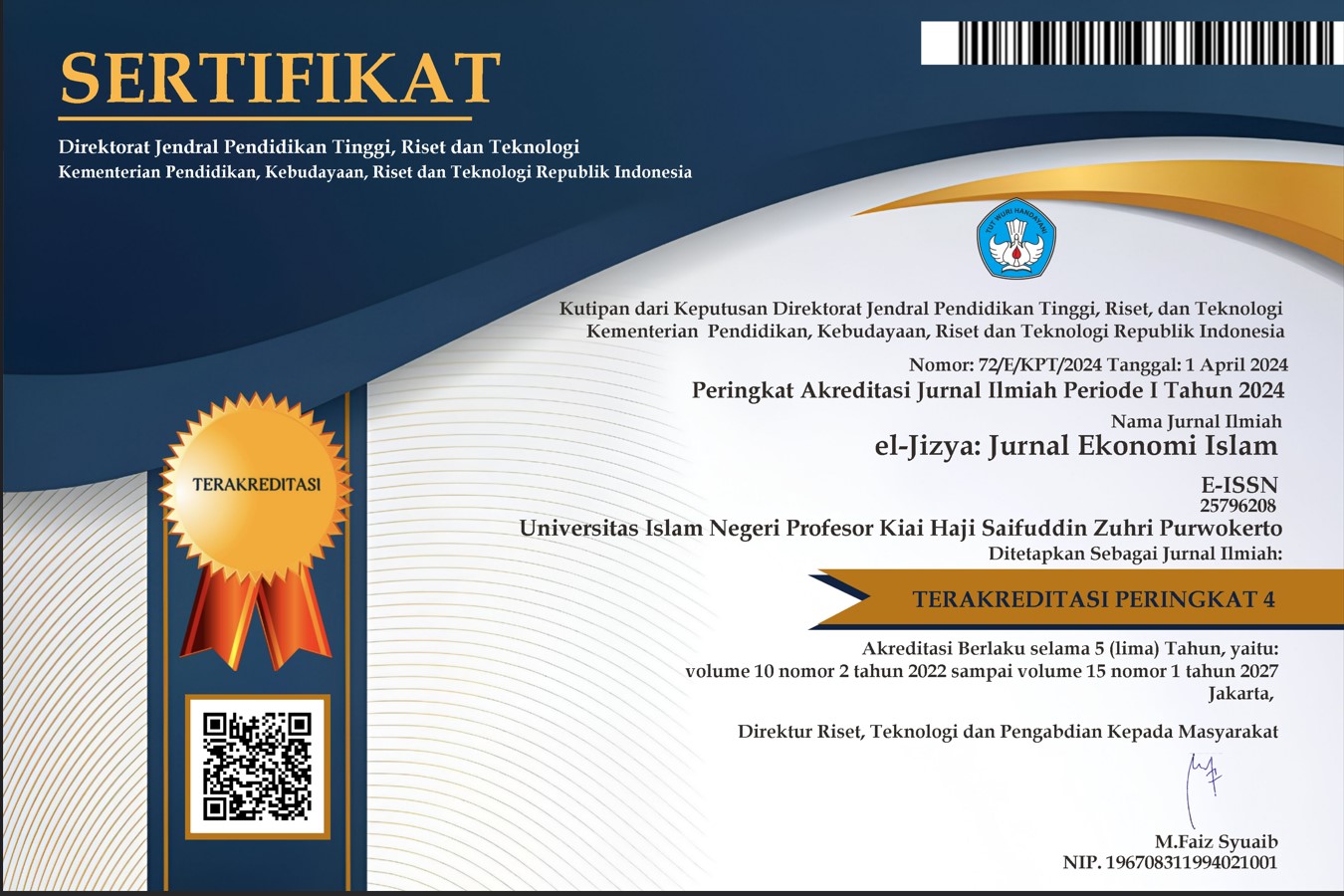Parallel Salam Contract Innovation for Agricultural Products at Bank Syariah Indonesia (BSI) Serang Branch, Banten
DOI:
https://doi.org/10.24090/ej.v13i1.13007Keywords:
Akad Salam Paralel, Inovasi Pembiayaan, Keuangan Syariah, Sektor PertanianAbstract
This study explores the innovation of parallel salam contracts as a solution for Sharia financing in the agricultural sector. Parallel salam contracts allow for advance payments for goods to be delivered in the future, thus providing farmers with initial capital. The approach used is qualitative with descriptive-analytical methods involving literature studies, interviews, and observations of financing practices in Islamic financial institutions (IFIs). The study results indicate that this contract innovation can increase financing flexibility, operational efficiency of IFIs, and compliance with Sharia principles. However, there are challenges in the form of operational risks, uncertainty in the quality and time of delivery of goods, and the need for supporting regulations. With good risk management, adoption of digital technology, and collaboration with the agricultural sector, parallel salam contracts can accelerate Sharia financial inclusion in Indonesia. In conclusion, parallel salam contracts have great potential as an innovative financing alternative in the agricultural sector. Regulatory support, socialization, and technological infrastructure are needed for the successful widespread implementation of this contract. This study significantly contributes to developing Sharia financial products based on market needs and Sharia principleReferences
Abdullah, M., & Haron, R. (2020). Fiqh Muamalah dalam Keuangan Syariah. Kencana.
Afria, R. (2022). Akad Salam, Permasalahan Dan Solusinya. Jurnal Keuangan Dan Perbankan Syariah, I(2), 86–93.
Ahmad, H., & Saleh, I. (2020). Dasar-dasar Keuangan Syariah dan Aplikasinya. Rajawali Pers.
Basri, M. (2020). Keuangan Syariah untuk Sektor UMKM. UII Press.
Fatimah, A., & Rahman, Z. (2019). Akad Salam dan Implementasinya dalam Industri Komoditas. Airlangga University Press.
Hakim, Z., & Mahmud, H. (2021). Implementasi Syariah dalam Produk Keuangan: Fokus pada Akad Salam Paralel. Universitas Muhammadiyah Malang Press.
Hakip, R. E. dan D. (2022). Akad As-Salam dalam Lembaga Keuangan Syariah. Jurnal Pendidikan Dan Konseling, 4(4), 3855. https://journal.universitaspahlawan.ac.id/index.php/jpdk/article/view/6084
Hamzah, M., Noor, H., & Firdaus, M. (2021). Inovasi Akad Salam dalam Keuangan Syariah: Perspektif Lembaga Keuangan Syariah di Indonesia. UII Press.
Hassan, A. (2021). Regulasi Perbankan Syariah di Indonesia. Pustaka Setia.
Ibad, B. (2023). Implementation of Salam and Istishna’ Contracts in Islamic Financial Institutions. Rangkiang: Journal of Islamic Economics and Business. https://doi.org/10.70072/rangkiang.v1i1.3
Ismail, S., & Karim, N. (2019). Inovasi dalam Produk Keuangan Syariah: Studi Akad Salam Parallel. IIUM Press.
Jaharuddin, & Maesarach, R. M. (2022). Akad Salam dan Problematikanya di Perbankan Syariah, Pendekatan Kritis. Media Ekonomi, 29(2), 1–16. https://doi.org/10.25105/me.v29i2.10135
Mansur, F. (2021). Konsep dan Aplikasi Akad dalam Perbankan Syariah. Alfabeta.
Mubarok Jaih, H. (2021). Fikih Muamalah Maliyah Akad Tabarru (4th ed.). Simbiosa Rekatama Media.
Muhamad Annas, Fatkhur Rohman, and I. K. (2022). IMPLEMENTASI AKAD SALAM TERHADAP JUAL BELI SAYURAN DI DUSUN SABUNG REJO DESA BAYU KECAMATAN SONGGON. Jurnal Ekonomi Syariah Darussalam. https://doi.org/10.30739/jesdar.v3i2.1664.
Muneeza, A., & Mustapha, Z. (2020). The Potential of Fintech in Enhancing the Use of Salam Contract in Islamic Banking. International Journal of Islamic Economics and Finance (IJIEF), 3(2), 305–334. https://doi.org/10.18196/ijief.3231
Nasution, M. S. (2022). Pengantar Ekonomi Islam: Prinsip dan Aplikasinya. RajaGrafindo Persada.
Otoritas Jasa Keuangan. (2021). Statistik Perbankan Syariah. Departemen Pengelolaan Data Dan Statistik. https://www.ojk.go.id/id/kanal/syariah/data-dan-statistik/statistik-perbankan-syariah/Default.aspx
Prayogi, B., & Ramadhan, D. A. (2024). Sharia Banking Contract Model: Alternative Financing For the Agricultural Sector in Indonesia. International Journal of Islamic Economics. https://doi.org/10.32332/ijie.v6i01.8829
Roziq, A., Hisamuddin, N., Wahyuni, N. I., Purnawati, I. (2014). Model Pembiayaan Salam pada Petani Singkong dan Usaha Kecil Berbahan Singkong di Kabupaten Jember. Jurnal Akuntasi Universitas Jember, 12(2).
Tariq, I., & Abbas, K. (2021). Digitalisasi dan Inovasi dalam Keuangan Syariah: Akad Salam dan Implementasinya di Era Digital. Deepublish.
Ummi Ibrahim Atah et al. (2019). Proposed Secured Bay-Salam Model for Financing Agriculture by Islamic Banks. International Journal of Management and Applied Research, 6(4). https://doi.org/10.18646/2056.64.19-013.
Widiana, W., & Annisa, A. A. (2018). Menilik Urgensi Penerapan Pembiayaan Akad Salam pada Bidang Pertanian di Lembaga Keuangan Syariah di Indonesia. Muqtasid: Jurnal Ekonomi Dan Perbankan Syariah, 8(2), 88. https://doi.org/10.18326/muqtasid.v8i2.88-101
Downloads
Published
How to Cite
Issue
Section
License
Copyright (c) 2025 Amalia Muazzah Adawiah, Cucu Susilawati, Yadi Janwari

This work is licensed under a Creative Commons Attribution-ShareAlike 4.0 International License.
Authors who publish with this journal agree to the following terms:
- Authors retain copyright and grant the journal right of first publication with the work simultaneously licensed under a Creative Commons Attribution-ShareAlike License that allows others to share the work with an acknowledgement of the work's authorship and initial publication in this journal.
- Authors are able to enter into separate, additional contractual arrangements for the non-exclusive distribution of the journal's published version of the work (e.g., post it to an institutional repository or publish it in a book), with an acknowledgement of its initial publication in this journal.
- Authors are permitted and encouraged to post their work online (e.g., in institutional repositories or on their website) prior to and during the submission process, as it can lead to productive exchanges, as well as earlier and greater citation of published work (See The Effect of Open Access).















